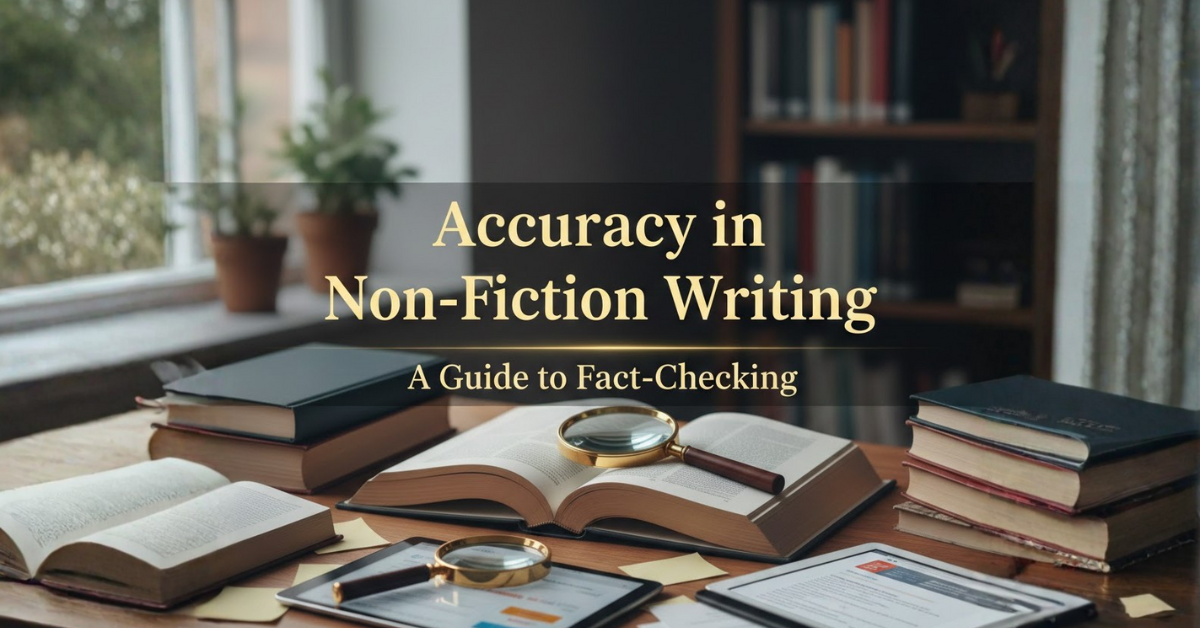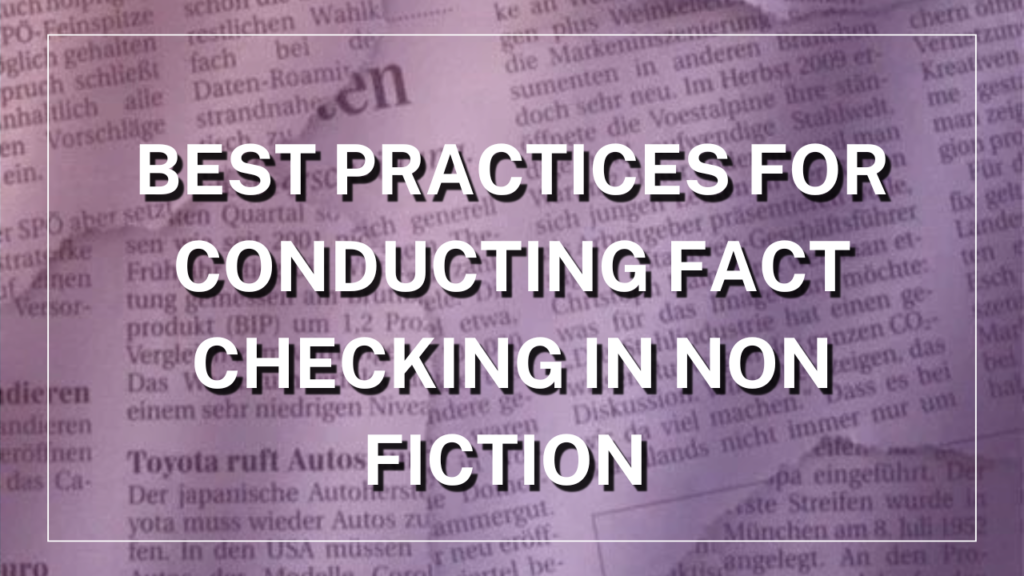
How to Achieve Accuracy in Non-Fiction Writing: A Guide to Fact-Checking
In today’s fast-paced world of information overload, non-fiction writing stands as a pillar of truth, providing readers with reliable knowledge and insight. Whether you’re working on a biography, academic paper, or self-help book, ensuring the accuracy of every claim is crucial.
Inaccuracies and misinformation can damage a writer’s reputation and trust with readers, making fact-checking not just a good practice but a necessity. If you’ve ever wondered how writers maintain credibility or why some books and articles stand the test of time, the answer lies in rigorous fact-checking.
By the end of this article, you’ll learn why accuracy in non-fiction writing is essential, the steps involved in effective fact-checking, and how maintaining high standards of truthfulness can protect your credibility. And, if you’re looking for professional help to ensure your non-fiction writing meets these standards, we’re here to guide you through the process.
Why Fact-Checking Matters in Non-Fiction

Fact-checking is the process of verifying that the information presented in non-fiction is accurate, trustworthy, and supported by credible sources. In non-fiction writing, this is vital because:
- Credibility at Stake: Readers trust non-fiction to provide accurate information. A single factual error can tarnish a writer’s reputation.
- Prevention of Misinformation: Inaccuracies, even small ones, can mislead readers and cause harm especially when it comes to historical facts, health advice, or political reporting.
- Respect for the Subject and Readers: Writers owe their readers the most accurate portrayal of the facts. Whether it’s research or an autobiography, the integrity of the work is a reflection of the writer’s professionalism.
- Long-Term Trust: Fact-checking helps build a long-lasting relationship with readers. Once trust is established, it increases the likelihood of future readership and engagement.
The Relationship Between Accuracy and Trust
Trust is the foundation of non-fiction. Unlike fiction, where creativity guides the narrative, non-fiction must rely on facts to provide value. When accuracy is compromised, readers may begin to doubt not just one piece of information but the entire narrative. A small error or unchecked claim can ruin a reader’s trust in an author or publication. Once lost, trust is hard to regain, and that is why accuracy should never be considered a minor detail but rather the backbone of all non-fiction writing.
Methods of Fact-Checking in Non-Fiction Writing

To maintain accuracy, non-fiction writers employ several fact-checking methods. These methods ensure that the information presented is well-supported and credible.
- Cross-Referencing Sources: Writers should consult multiple credible sources to verify the accuracy of a claim. This process helps ensure that information is not based on a single account or biased source.
- Using Primary Sources: When possible, writers should rely on primary sources like government reports, interviews, or original documents. These sources offer the most direct and reliable form of evidence.
- Consulting Experts: For specialized topics, consulting subject matter experts can provide deeper insights and help correct any misinterpretations that may arise in technical fields.
- Reviewing Dates and Statistics: Numbers, dates, and statistics are often areas prone to errors. Fact-checkers ensure these details are precise and consistent throughout the text.
- Citing Sources Properly: Proper citations allow readers to trace the origins of the information, increasing the credibility of the work. Transparency in sourcing is a crucial part of the fact-checking process.
The Role of Editors and Professional Fact-Checkers

Writers are not alone in the fact-checking process. Editors and professional fact-checkers play an essential role in ensuring accuracy. Editors may check facts for clarity, style, and consistency, while professional fact-checkers often use rigorous databases and academic references to validate every detail. This collaborative effort ensures that the final work is not only polished but accurate.
The Ethical Responsibility of Non-Fiction Writers

Fact-checking goes beyond accuracy; it’s an ethical responsibility. Non-fiction writers shape public opinion and societal understanding. Whether they’re writing about historical events or current issues, the facts they present can influence perceptions and decisions. Misrepresenting the truth, intentionally or unintentionally undermines the writer’s credibility and goes against their ethical duty to inform the public.
Challenges in Fact-Checking

While fact-checking is vital, it’s not always easy. Some of the common challenges include:
- Lack of Reliable Sources: Some topics may have limited or contradictory sources, making verification difficult.
- Pressure of Deadlines: Writers may face tight deadlines that lead them to skip thorough fact-checking processes.
- Bias and Interpretation: Writers may unintentionally let their biases influence how they interpret information.
Despite these challenges, it is crucial to prioritize accuracy at every stage of the writing process.
The Impact of Inaccurate Non-Fiction
Neglecting fact-checking can have significant consequences:
- Damage to Credibility: A writer who publishes inaccurate information may lose the trust of their audience, causing a drop in readership and credibility.
- Legal Consequences: Inaccurate facts, especially defamatory ones, can result in lawsuits or legal issues.
- Misinformation Spread: Incorrect information can perpetuate myths or distort public understanding, which can have harmful societal impacts.
- Historical or Cultural Distortion: Reporting inaccurate history or events can alter how society remembers them, potentially reshaping public consciousness.
Future of Fact-Checking in the Digital Age
With the rise of digital media, fact-checking has become both easier and more difficult. On the one hand, vast online databases provide easy access to accurate information. On the other hand, the spread of fake news, doctored images, and manipulated statistics has complicated the fact-checking process. Writers must now hone their critical thinking and research skills to ensure they can navigate this landscape and produce trustworthy content.
Conclusion
Fact-checking and accuracy are not just optional elements of non-fiction writing—they are its foundation. By ensuring that every claim, date, and statistic is verified, writers maintain credibility, protect readers from misinformation, and uphold their ethical responsibilities. In today’s information-rich world, accuracy is the ultimate measure of a writer’s integrity.
If you are looking to ensure your non-fiction writing is accurate and trustworthy, our services can help you maintain high standards of fact-checking and credibility. Let us assist in refining your content, ensuring that it remains factually accurate and credible in the ever-evolving digital world.
FAQs
1. Why is fact-checking important in non-fiction writing?
Fact-checking ensures credibility, prevents misinformation, and builds trust with readers.
2. How do writers fact-check their work?
Writers cross-reference sources, consult experts, verify statistics, and rely on primary documents.
3. Who is responsible for fact-checking, writers or editors?
Both the writer and editor are responsible for ensuring accuracy, with editors providing additional layers of scrutiny.
4. What happens if a non-fiction book contains errors?
Errors can harm a writer’s credibility, mislead readers, and result in legal issues or reputational damage.
5. How has technology changed fact-checking?
Technology has made information access faster but has also increased the spread of misinformation, making critical research skills even more essential.
